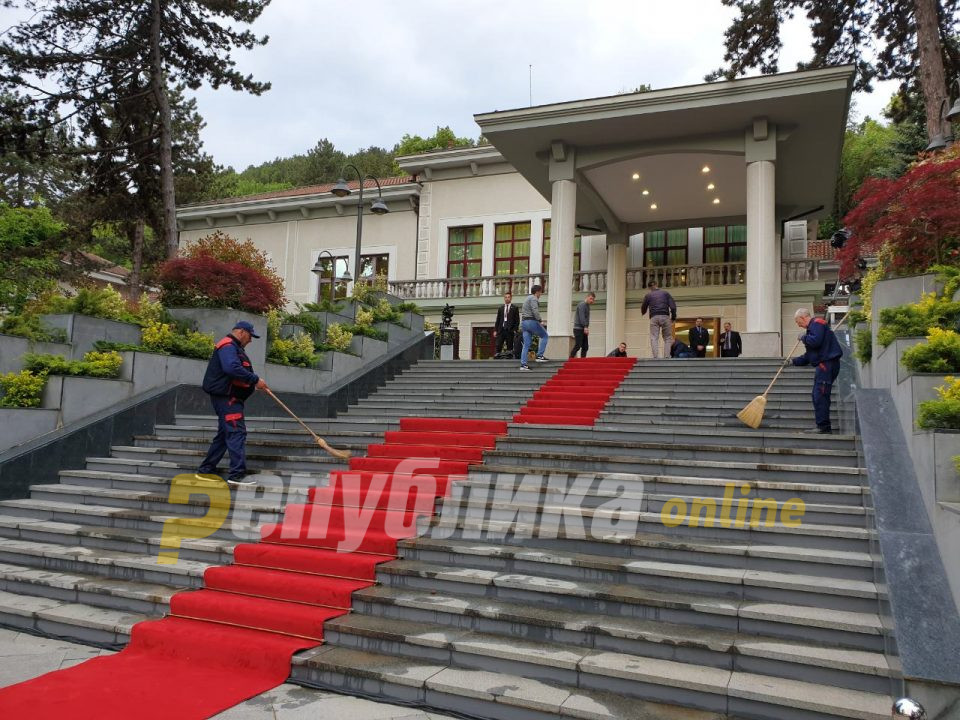The DUI party rounded up the list of presidential candidates today, when it nominated Foreign Minister Bujar Osmani as its candidate. DUI leader Ali Ahmeti was announcing that he will run himself, but faced with the growing popularity of the opposition bloc and the threat that VMRO voters, assured in their victory in the first round of the presidential elections, engage in tactical voting against him and in favor of the opposition Albanian candidate Arben Taravari, he backed out of the race today.
I play in the super league and Taravari is in the local league, said Ahmeti, explaining his decision to nominate Osmani instead. Osmani is running on the motto that DUI is using on the Albanian voters, declaring “Yes to Europe, no to Russia” – alleging that any vote against SDSM or DUI helps Russia. He is pointing to his record as Foreign Minister, including the recent meeting of OSCE Foreign Ministers in Skopje. The record also includes a complete failure to capitalize on the name change Macedonia was pressured to perform which, instead of toward quick EU accession, led to a Bulgarian veto. Osmani is also dogged by serious corruption scandals, just as are other DUI party officials.
The big 4 list of candidates now has Gordana Siljanovska-Davkova for VMRO-DPMNE, Stevo Pendarovski for SDSM, Osmani and Taravari. Siljanovska and Pendarovski are not yet official candidates, but Siljanovska is the only candidate who submitted her nomination to VMRO, and Pendarovski has been briefing the press that SDSM decided to support him for a second term. This makes it very likely that we see a repeat of the 2019 race, when Pendarovski beat Siljanovska in the second round with the help of all the Albanian parties put together – but this year the Albanian bloc is divided and VMRO greatly outperforms SDSM in the polls.
Other candidates include Siljanovska’s close friend, professor Biljana Vankovska, for Levica; Kumanovo Mayor Maksim Dimitrievski from the ZNAM party, Karpos Mayor Stevce Jakimovski for the GROM party, epidemiologist Velo Markovski and migrant activist Mersiha Smailovic from the Bosniak BDS party. It takes 30 votes in Parliament or 10,000 signatures fro mvoters to nominate a candidate, so many of the lesser candidates will likely not be on the list.
The first round of the presidential elections, scheduled for April 24th, is likely to set the mood for the general elections on May 8th. With VMRO runaway favorites in the polls and the likely failure of SDSM and DUI to agree to a pre-election coalition, the next line of defense for the current Government is to try to make it difficult for VMRO to form a post-election coalition with the Albanian opposition parties.
DUI officials today said that they will not join any Macedonian party in coalition after the elections unless they agree to accept the Bulgarian demands for changes to the Constitution and to change the way the presidents are elected in the future – instead of a direct vote, to have them elected in the Parliament with the Albanian members of Parliament having a veto on the candidate. The Albanian opposition parties are also demanding that the Constitution is changed in the section where it lists the Albanian language as an official language, but uses the term “language spoken by more than 20 percent of the population” instead of directly naming the Albanian language.
This raises the possibility of the Albanian parties trying to boycott the second round of the presidential elections. This would be difficult to pull off, since supporters of both DUI and the Albanian opposition bloc would be urged to vote on the general election, but will have to be instructed to request only one ballot from the commission, and leave the ballot for the presidential elections unused. If turnout in the presidential elections is below 40 percent of all registered voters, then the election is declared invalid, and this would give DUI leverage to demand changes to the way the president is elected – insisting that no President will be elected without the approval of the Albanian parties. It’s possible that VMRO-DPMNE and SDSM fail to reach the 40 percent threshold if all the Albanian parties pull off the boycott.






Comments are closed for this post.